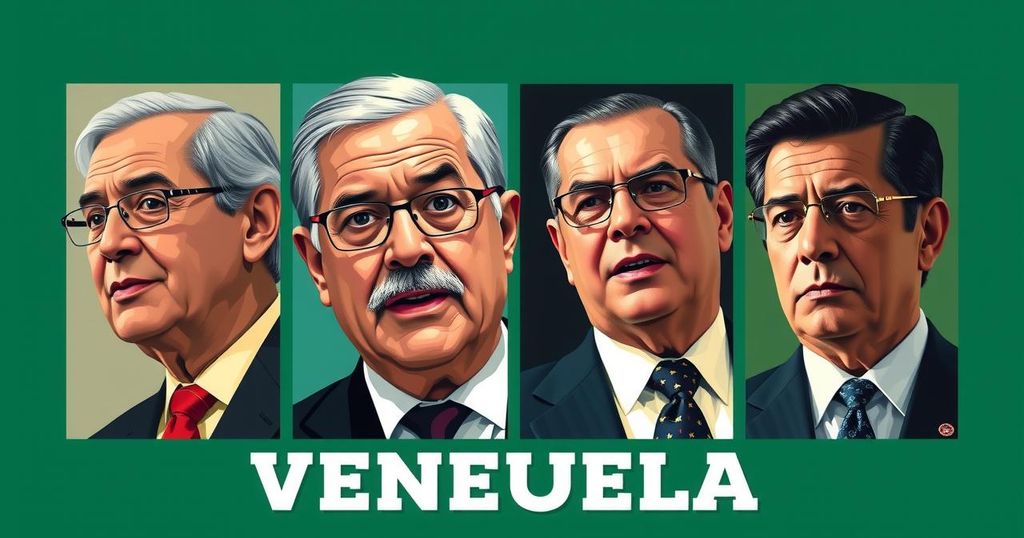Venezuela Declares Former Mexican Presidents Persona Non Grata Amid Political Tensions

Venezuela’s National Assembly has designated former Mexican presidents Vicente Fox and Felipe Calderón as personae non gratae, igniting tensions amidst claims of election fraud. This declaration extends to other Latin American leaders supporting opposition figure Edmundo González Urrutia, who asserts victory over President Nicolás Maduro. The political landscape remains complex, with calls for independent election verification and differing international support.
Venezuela’s National Assembly has officially designated former Mexican Presidents Vicente Fox and Felipe Calderón as personae non gratae amidst escalating political tensions within the country. This designation, supported by the ruling party majority, also extends to seven other former Latin American leaders who have endorsed opposition figure Edmundo González Urrutia, who contests the validity of the recent 2024 elections. President Nicolás Maduro was sworn in for a contentious third term, which has been disputed by González, who claims victory in the vote.
The Assembly, dominated by pro-Maduro members, has declared that these leaders would face prosecution as a so-called foreign force attempting to undermine Venezuela’s sovereignty should they enter the country. Diosdado Cabello, the Minister of the Interior, intensified the situation by publicly displaying “wanted” posters of the aforementioned leaders, accusing them of conspiracy and jeopardizing the nation’s peace. The posters are reportedly being disseminated across the country, including points of entry like ports and airports.
Both Fox, President from 2000 to 2006, and Calderón, who served from 2006 to 2012, have not made direct comments regarding the Venezuelan elections, though they have voiced support for González in various forums. Notably, Calderón is set to accompany González during an upcoming tour of Latin America prior to a proposed swearing-in ceremony. Other former leaders on the unwelcome list include Mario Abdo of Paraguay, Mireya Moscoso and Ernesto Pérez Balladares from Panama, Jorge Quiroga of Bolivia, Jamil Mahuad from Ecuador, and Laura Chinchilla of Costa Rica.
Following the National Electoral Council’s announcement proclaiming Maduro as the victor in the July elections, former Mexican President Andrés Manuel López Obrador asserted that Mexico would acknowledge the result as part of democratic principles. However, he later indicated Mexico’s non-participation in further discussions regarding the election process. In contrast, González has received international recognition as the legitimate victor from countries including the United States, Canada, and several European Union nations, with support for Maduro rooted in countries such as Russia, China, and Cuba.
Amid these developments, officials from Mexico, Brazil, and Colombia have advocated for an independent verification of the election results, with credible observers suggesting that González triumphed by a significant margin, reportedly two-to-one. Maduro’s inauguration witnessed attendance from ten heads of state, though some allies, including Colombian President Gustavo Petro, were notably absent due to political disputes. The event was represented by Mexico’s ambassador, with President Claudia Sheinbaum affirming respect for the Venezuelan populace in determining their internal matters.
The article discusses the recent political maneuvers in Venezuela concerning the legitimacy of the presidential elections. It highlights the increasing rift between the Maduro administration and other Latin American figures who support the opposition leader, Edmundo González Urrutia, amid claims of electoral fraud. The political atmosphere is intensified by the Venezuelan government’s decision to label former Mexican presidents as unwelcome adversaries, reflecting broader tensions in Latin American diplomatic relations, especially concerning electoral integrity and governance legitimacy.
In conclusion, Venezuela’s National Assembly has escalated political tensions by declaring Fox and Calderón unwelcome and issuing wanted posters amid a contentious electoral atmosphere. The fallout involves broader implications for regional politics as supporting nations back opposition claims of electoral victory over Maduro’s administration. As calls grow for independent verification of election results, the situation remains deeply polarizing, echoing larger themes of political legitimacy and international support in Latin America.
Original Source: mexiconewsdaily.com








